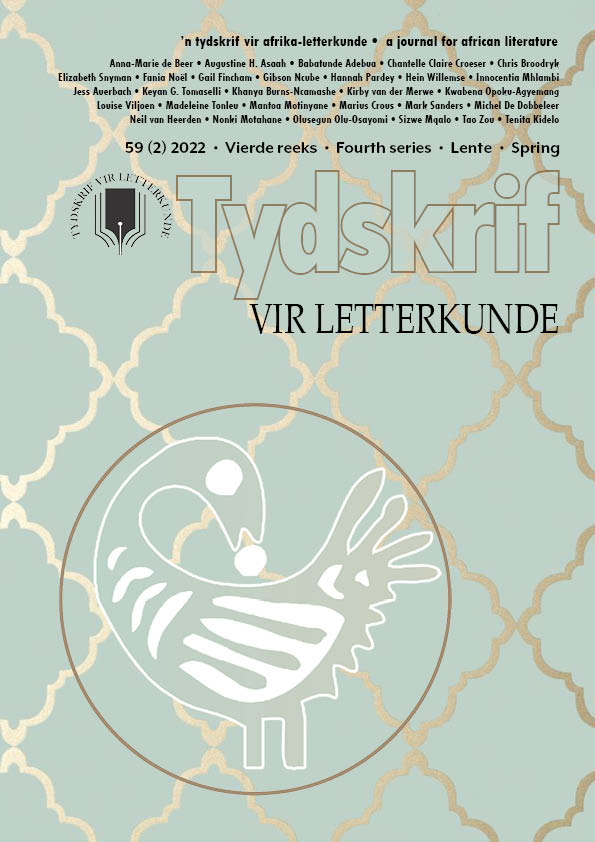Womanism in Crépuscule du tourment: Mélancolie by Léonora Miano
DOI:
https://doi.org/10.17159/tl.v59i2.13047Keywords:
womanism, identity crisis, alienation, Léonora Miano, afrocentrismAbstract
In this article we examine the notion of womanism as portrayed in the 2016 novel Crépuscule du tourment: Mélancolie (Twilight of Torment: Melancholy) by the Franco-Cameroonian author Léonora Miano . We explore how four female characters are subjected to discrimination on various levels: racial, sexist, and even linked to social divisions. We furthermore trace the religious, historical, cultural and sexual aspects of the identity crisis that each character undergoes. The tales by these four voices depicting their suffering and different defence strategies finally point to the womanism of the author herself which this article aims to discuss drawing on a range of definitions provided by scholars such as bell hooks, Molara Ogundipe-Leslie and Alice Walker. Our reading of the novel focusses on the mechanisms of resistance (exploration of homosexual relations, recourse to afrocentricity) deployed by these female characters in an environment where neither Western feminism nor activism seem to respond to the complexity of their alienation. Miano’s heroines attempt to reconstruct their identities in terms of culture, territory, the other and the “self”. Their revolt and courage to speak out constitute acts of self-determination. This emancipatory quest leads to a form of hybridity that embraces both modernity and traditional values, with its myths and customs, and which results in a reconstructed and plural identity. It also constitutes an approach by an African author that embraces both a return to the self and an openness to the outside world.
Downloads
References
Acholonu, Catherine Obianuju et al. Motherism: The Afrocentric Alternative to Feminism. Afa, 1995.
Adebayo, Aduke. “The African Mother: Her Changing Perceptions in West African Fiction.” Feminism and Black Women’s Creative Writing: Theory, Practice, and Criticism, dirigé par Aduke Adebayo. AMD, 1996, pp. 178–93.
Braidotti, Rosi. Nomadic Subjects: Embodiment and Sexual Difference in Contemporary Feminist Theory. Columbia U P, 1994.
De Beauvoir, Simone. Le deuxième sexe: Les faits et les mythes. t. 1, Gallimard, 1949.
Fanon, Frantz. Peau noire, masques blancs. Seuil, 1952.
Gallant, Julie Édeline. “hooks, bell (2015). Ne suis-je pas une femme: Femmes noires et féminisme.” Reflets vol. 23, no. 1, 2017, pp. 220–3. https://doi.org/10.7202/1040756ar
Glissant, Édouard. La cohée du Lamentin. Gallimard, 2005.
Gruzinski, Serge. La pensée métisse. Fayard, 1999.
Hall, Stuart. “The Question of Cultural Identity.” Modernity and its Futures, dirigé par Stuart Hall et al. Polity & Open U, 1992, pp. 274–361.
hooks, bell. Feminism is for Everybody: Passionate Politics. South End, 2000.
Houtart, Manon. “Léonora Miano à propos du féminisme: ‘Il faut inventer d’autres mots’.” rtbf: Radio-télévision belge de la communauté française. 10 sep. 2019. https://www.rtbf.be/article/leonora-miano-a-propos-du-feminisme-il-faut-inventer-d-autres-mots-10311000.
Laing, R. D. The Divided Self: An Existential Study in Sanity and Madness. Pantheon, 1960.
Mbembe, Achille. Critique de la raison nègre. Découverte, 2013.
Miano, Léonora. Habiter la Frontière: Conférences. Arche, 2012.
Miano, Léonora. L’impératif transgressif. Arche, 2016.
Miano, Léonora. Crépuscule du tourment: Mélancolie. Grasset, 2016.
Miano, Léonora Crépuscule du tourment: Héritage. Grasset, 2017.
Miano, Léonora. L’intérieur de la nuit: Roman. Plon, 2015.
Miano, Léonora. Tels des astres éteints: Roman. Plon, 2008.
Miano, Léonora. Contours du jour qui vient: Roman. Plon, 1996.
Miano, Léonora & Trésor Simon Yoassi. “Entretien Avec Léonora Miano.” Nouvelles Études Francophones vol. 25, no. 2, 2010, pp. 101–13. DOI : https://doi.org/10.1353/nef.2010.0059.
Ogundipe-Leslie, Molara. “Stiwanism: Feminism in an African Context.” African Literature: An Anthology of Criticism and Theory, dirigé par Tejumola Olaniyan & Ato Quayson. Blackwell, 2007, pp. 542–50.
Ogunyemi, Chikwenye Okonjo. “Womanism: The Dynamics of the Contemporary Black Female Novel in English.” Signs vol. 11, no. 1, 1985, pp. 63–80.
Sartre, Jean-Paul. L’être et le néant: Essai d’ontologie phénoménologique. Gallimard, 1943.
Walker, Alice. In Search of Our Mothers’ Gardens: Womanist Prose. Harvest/Harcourt, 1983.
Downloads
Published
Issue
Section
License
Copyright (c) 2022 Tydskrif vir Letterkunde

This work is licensed under a Creative Commons Attribution-ShareAlike 4.0 International License.


 https://orcid.org/0000-0001-6465-6584
https://orcid.org/0000-0001-6465-6584


.png)